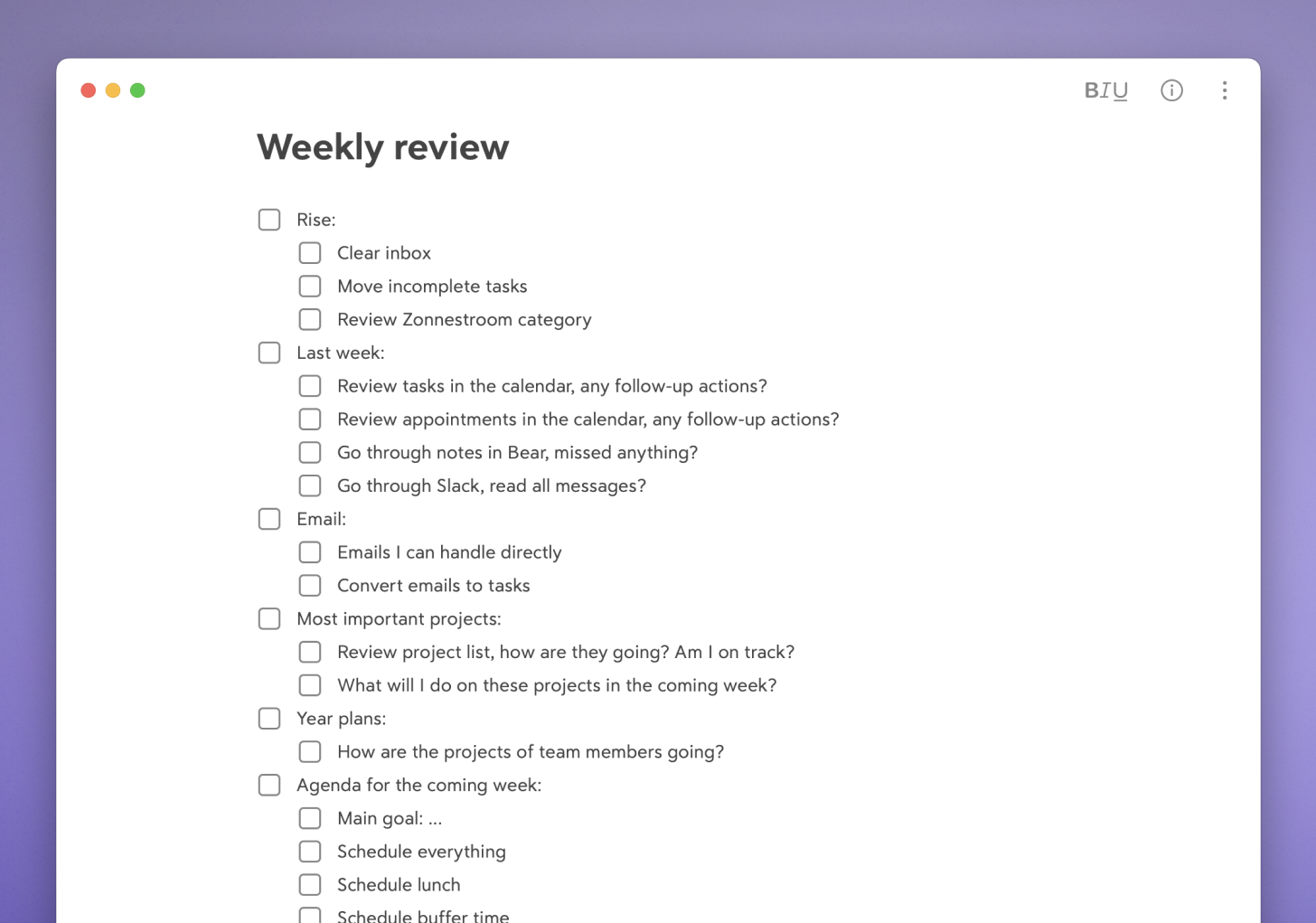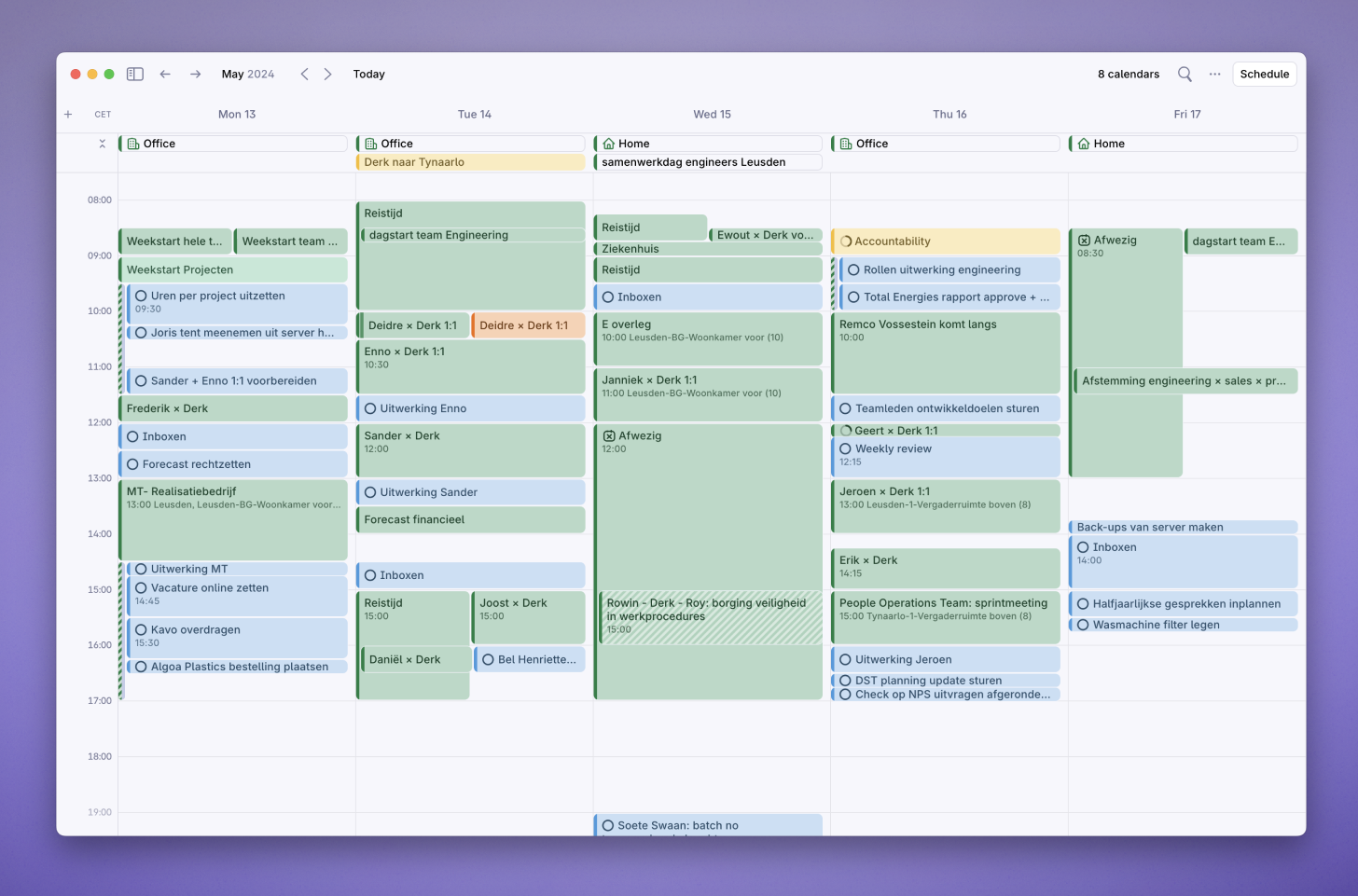FocusTime: Derk Oosterveld shares his template to stay sane while managing multiple companies
How a team lead, social entrepreneur and father uses a smart weekly review template to run his teams

We (as interviewers) were actually running over time and late to the meeting, annoyingly. That was not a problem at all, if we could fit it in twenty minutes and stick to the end time. Derk would need to jump over to another item on his calendar right after. Such a rigid schedule – doesn’t that feel absolutely claustrophobic? “It is actually simple”, says Derk: “I sat down on a quiet moment to define my priorities last week, so I thought about their importance. The last thing you want to do is completely change your plans in the heat of the moment. Those decisions will definitely not be your finest.” That makes sense.
And with this in mind, we now understand how Derk manages all of his responsibilities. He is a team lead at Zonnestroom – a company that installs huge solar installations across The Netherlands. Next to that he’s the founder of Soete Swaan, a booming business that produces and sells a Dutch treat – stroopwafels – in South Africa. Soete Swaan is operated by a team of young people that normally would have a very hard time getting a job, because of physical or mental disabilities. Derk has local people on the ground working on production and sales, and travels there every few months to help out. And last but not least, he’s a father of two young boys.

That’s a packed list with lots of things going on. How do you have a good day, Derk?
“It all starts on Friday. I’ll spend about an hour in my Weekly Review, where I’m checking in on last week and plan the next one. I’m following a checklist where I’m spending time cleaning up and organizing, as well as figuring out what I’m going to do next.” Derk shared this one with us so you can copy and use it as well. “The first part, cleaning and organizing, is crucial for me to not let things slip, and to clear my head. I’m going over my todo lists, mailboxes and other places where I’m dropping things during the week to make sure everything is in its place.”
Here's the top section of Derk's Weekly Review checklist:

(Click to open Derk's checklist in Google Docs to use as a template)
“After that cleaning up is done I’m focusing on what’s ahead. For that I’m basically going over each of my roles I have defined in Rise. I’m questioning myself per role: what is the most important and biggest impact thing I can do next week? I’m trying to fit in as many of them in my calendar as possible. Those are the quadrant two type things.” Derk is referring to the Eisenhower matrix, which splits work into important–not important, and urgent–not urgent tasks. Quadrant two holds important and not urgent work. The stuff that is easy to defer to later but most likely has huge impact on the longer term.
Roles are also fantastic to see what you’re not supposed to spend your time on. Derk: “When I’m looking at what I have done, both planned and unplanned, I often spot things that are actually not my role at all. In the short term, it might be good for the company if I’m picking up those things, but I’m not helping my team scale in the long term. When I’m thinking about those items in the context of the roles I have, it’s a lot easier to see what I should stop doing.”
“Next to those roles I also have quarterly and yearly goals, both for the team as well as for myself. Those are simply an item on my weekly checklist and listed in a Google Doc. By checking weekly I’ll make sure next steps are on my radar.”
Another smart item on Derk’s checklist: make time to process meetings. “A lot of my time is actually spent in meetings. There’s always follow up needed, which I always dread when I don’t do it right away. I’m much more inclined to act upon it if I do it right away, when the contents are still fresh. So to make that happen I make sure to block off time after each meeting to process the results as soon as possible. I’ll then go through Bear – a fantastic note taking app – and tackle it then and there.”

As you can see: Derk mixes meetings and tasks to stay on track. In this screenshot you can also spot the processing of meetings already built into his schedule: he makes sure there's time to process what was discussed on his 13:00 meeting on Monday right after ('Uitwerking MT'). Same thing on Tuesday: a follow up task is ready to go after his meetings with Enno (10:30) and Sander (12:00). Also note how the colors help to quickly separate between meetings and tasks.
How do you make your plan happen?
“I’m at my best if I start my day with my email inbox closed, focus mode on and by switching Slack to do not disturb. I’m digging in for that important task and as a reward I’ll allow myself time on Slack and email as soon as that thing is finished. Incentivizing myself with those small rewards really help me get those important tasks done.”
“There’s always a lot going on, and I find that those things that pop into my head are super distracting. I’m using Rise extensively to put all those loose ends in their inbox, which works great. I’ll process that list at the end of every day. I also make sure I have about 30-60 minutes of time per day to just respond to things that happen. Since I know those things will happen, I better just take it into account in my schedule.”
“I have a nice rhythm in my week too, and I really look forward to Thursdays – those are the days with almost no meetings where I can really get some big things done. I know this and I make sure to plan my most complex and difficult tasks on that day.”
How do you improve your team?
“I’m not just responsible for my own performance, but I’m also spending about 40% of my time thinking about things that improves the processes and way of working of everyone at Zonnestroom. One of the things I just introduced is a survey we’ll send out every other month, with a few key questions around wellbeing to check in on happiness, stress and fun, but also things like ‘Do you know what your key priority is?’, ‘Are you feeling fulfilled by the work you are doing?’ and ‘How do you feel about the work processes that we have in place, are they helpful or not?’ I feel more and more teams focus on wellbeing, and for me the way we work is also a big part of that. It really helps me balance things for myself and at home, so I hope I can pass some of that on to the rest of the team.

Any specific tools you recommend?
“I already mentioned a few: I could not live without Rise to manage my calendar and my tasks, and Bear to manage my notes. I also want to mention Braintoss – which I'm using countless times every day to quickly get open items out of my head and into my system.”
Anything else you’d like to share?
"Check out Soete Swaan!"
Key take-aways from Derk
- Clearly define your roles and link all your time to those roles
- Have a weekly review routine in place to process your past week and plan ahead
- Block off processing time for your meetings, as close to the actual meeting as possible
- Have a fast route to quickly get distracting tasks out of the way so you can stay focused on what is in front of you. Derk is using Rise and Braintoss for that.
- If you’re a leader: consider running a regular ‘way of working’ survey to not just check in on how everyone is doing but also get feedback on how work is executed